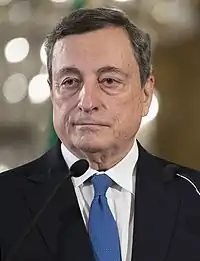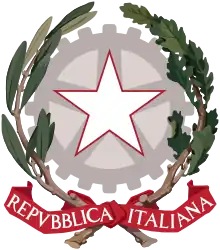Draghi government | |
|---|---|
67th Cabinet of Italy | |
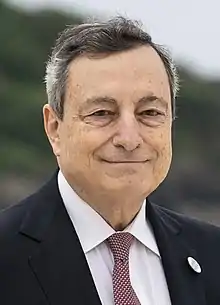 | |
| Date formed | 13 February 2021 |
| Date dissolved | 22 October 2022 (617 days) |
| People and organisations | |
| Head of state | Sergio Mattarella |
| Head of government | Mario Draghi |
| No. of ministers | 24 (incl. Prime Minister) |
| Member parties | |
| Status in legislature | National unity government |
| Opposition parties | |
| History | |
| Election(s) | 2018 election |
| Legislature term(s) | XVIII Legislature (2018–2022) |
| Incoming formation | 2021 government formation |
| Outgoing formation | 2022 government crisis |
| Predecessor | Second Conte government |
| Successor | Meloni government |
| ||
|---|---|---|
|
||
The Draghi government was the 67th government of the Italian Republic, led by former President of the European Central Bank, Mario Draghi. It was in office between 13 February 2021[1][2] and 22 October 2022.
The Draghi government was formed following the resignation of Prime Minister Giuseppe Conte in the midst of a political crisis which led to the Conte government losing its majority. After consultations with political parties, President Sergio Mattarella tasked Draghi with forming a "high-profile" government.[3] Mattarella stated that the new government would have to face the health, economic and social crises related to the COVID-19 pandemic, as well as overseeing the EU relief fund associated with it.[4][5] The Draghi government was described as a national unity government by numerous news sources.[6][7][8][9] The choice by Mattarella to appoint Draghi as Prime Minister was welcomed by some international observers, with others casting doubt on the stability of a new technocratic government.[10][11]
The Draghi Government was formed with both politicians and independent technocrats, and is supported by a large majority of the Italian Parliament, including the anti-establishment Five Star Movement (M5S), the right-wing League (Lega), the centre-right Forza Italia (FI), the centre-left Democratic Party (PD), the centrist Italia Viva (IV), and the leftist Article One (Art.1).[6][12]
On 21 July 2022, following M5S, Lega and FI's withdrawal of their support to the government, Prime Minister Draghi handed his resignation. The government continued to operate as a caretaker government until the next government formation following the 2022 Italian general election on 25 September.[13]
Supporting parties
Beginning of term
At the time of the government formation, its ministers were part of the following parties.
| Party | Main ideology | Leader | |
|---|---|---|---|
| Five Star Movement (M5S) | Populism | Giuseppe Conte | |
| League (Lega) | Right-wing populism | Matteo Salvini | |
| Democratic Party (PD) | Social democracy | Enrico Letta | |
| Forza Italia (FI) | Liberal conservatism | Silvio Berlusconi | |
| Italia Viva (IV) | Liberalism | Matteo Renzi | |
| Article One (Art.1) | Social democracy | Roberto Speranza | |
End of term
Since 1 August 2022 the government is composed of the following parties.
| Party | Main ideology | Leader | |
|---|---|---|---|
| League (Lega) | Right-wing populism | Matteo Salvini | |
| Democratic Party (PD) | Social democracy | Enrico Letta | |
| Five Star Movement (M5S) | Populism | Giuseppe Conte | |
| Action (A) | Social liberalism | Carlo Calenda | |
| Together for the Future (IpF) | Reformism | Luigi Di Maio | |
| Italia Viva (IV) | Liberalism | Matteo Renzi | |
| Article One (Art.1) | Social democracy | Roberto Speranza | |
| Environment 2050 (A2050) | Environmentalism | Federico D'Incà | |
On 21 June 2022, Luigi Di Maio led a breakaway group outside of the M5S and formed Together for the Future, which confirmed its support for the government. Mariastella Gelmini, Renato Brunetta and Mara Carfagna left FI on 21, 22 and 26 July, respectively. On 29 July, Gelmini and Carfagna joined Action. On 30 July, Federico D'Incà left the M5S, and on 1 August he founded Environment 2050 alongside deputy Davide Crippa.
History
Background
On 13 January 2021, Italia Viva (IV) withdrew its support for the second Conte government, triggering a political crisis.[14] Conte subsequently won confidence motions in both houses of Parliament, with the abstention of IV, but could only reach a plurality in the Senate, rather than an absolute majority.[15][16][17] In the wake of this, Conte tendered his resignation to President Mattarella, who then began a round of discussions with various parties to form a new government.[18]
Government formation
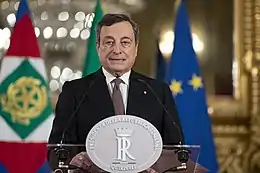
Mattarella met with delegations of political parties on 28 and 29 January to determine their views on the formation of a new government. The Five Star Movement (M5S), Democratic Party (PD), Free and Equal (LeU), For the Autonomies, Europeanists, and some members of the Mixed Group all expressed support for the reappointment of Conte as Prime Minister, but IV ruled this out.[19][20][21] The centre-right and right-wing parties, the League (Lega), Forza Italia (FI) and the Brothers of Italy (FdI), stated that they preferred a snap election, but would be willing to join a national unity government under certain conditions.[22][23] Following this deadlock, Mattarella asked Roberto Fico, the President of the Chamber of Deputies, to explore the possibility of a grand coalition government.[24] On 2 February, Fico confirmed that there was insufficient support for the proposal.[25]

With the prospect of early elections looming, on 3 February Mattarella invited former ECB President Mario Draghi to the Quirinal Palace to charge him to forming a national unity government.[26] Draghi accepted the offer, and began consultations with the leaders of political parties.[27] Conte publicly endorsed him as his successor the following day, and further negotiations commenced.[28] On 10 February, League leader Matteo Salvini and FI leader Silvio Berlusconi jointly announced their support for Draghi.[29] Conversely, FdI leader Giorgia Meloni stated that her party would go into opposition.[30] The PD's national board unanimously voted on 11 February to support Draghi.[31] The same day, the M5S held an online referendum on whether to "support a technical-political government with the other political forces indicated by the appointed prime minister Mario Draghi", which was approved by 59.3%.[32]
Having achieved sufficient support, on 12 February Draghi met with President Mattarella at the Quirinal Palace and presented his list of ministers. The Draghi government was sworn in on the following day, 13 February, at 11:00 AM UTC.[33][34] The government was composed of twenty-four ministers, eight women and sixteen men, most of them from Northern Italy, largely from Lombardy and Veneto; it contained representatives from all supportive political parties, as well as numerous independent technocrats.[35][36]
Investiture vote
On 17 February 2021, the Senate approved the Draghi government with 262 votes in favour, 40 against and 2 abstentions.[37] The following day, the Chamber of Deputies affirmed its support, with 535 votes in favour, 56 against and 5 abstentions.[38] This was the third largest majority garnered by a government in the history of the Italian Republic after the Monti government and after the fourth Andreotti government.[39]
17–18 February 2021 Investiture votes for Draghi Cabinet | |||
|---|---|---|---|
| House of Parliament | Vote | Parties | Votes |
| Senate of the Republic (Voting: 302 of 321, Majority: 152) |
M5S (69), Lega–PSd'Az (62), FI–UDC (49), PD (35), IV–PSI (17), Eur–MAIE–CD (10), Aut (5), LeU (4), IdeA–C! (3), +E–A (2), Others (6) | 262 / 302 | |
| FdI (19), M5S (15),[40] LeU / Italian Left (2), Others (4) | 40 / 302 | ||
| Abstention | Aut (1), Others (1) | 2 / 321 | |
| Chamber of Deputies (Voting: 591 of 630, Majority: 296) |
M5S (155), Lega (125), PD (91), FI (81), IV (28), CD (14), LeU (11), C! (10), NcI−USEI−AdC (5), SVP–PATT (4), A–+E–RI (4), Eur–MAIE–PSI (2), Others (5) | 535 / 591 | |
| FdI (31), M5S (16),[41] Lega (1),[42] LeU / Italian Left (1), Others (7) | 56 / 591 | ||
| Abstention | M5S (5)[41] | 5 / 630 | |
Government crisis and collapse
In July 2022, the M5S did not participate to a confidence vote in the Senate on a government bill, the so-called decreto aiuti, regarding a €27 billion economic aid to counteract the energy and economy crisis. Prime Minister Draghi offered his resignation, which was rejected by President Mattarella.[43] After a few days, on 20 July, Draghi spoke to the Senate again, seeking a confidence vote again to secure the government majority supporting his cabinet, while rejecting the proposal put forward by Lega and FI on a new government without the M5S.[44] In that occasion, the M5S, Lega and FI, three major parties which were supporting the Draghi government, withdrew their support.[45] Consequently, Draghi tendered his final resignation to President Mattarella, who dissolved the houses of Parliament, leading to an early election in September 2022,[46][47] and asked Draghi to stay in office to handle current affairs (as is customary in Italian politics) until a new government could be formed following the upcoming general election.
Party breakdown
Beginning of term
Ministers
9 | |
4 | |
3 | |
3 | |
3 | |
1 | |
1 |
Ministers and other members
- Independents: Prime minister, 8 ministers, 3 undersecretaries
- Five Star Movement (M5S): 4 ministers, 2 deputy ministers, 9 undersecretaries
- League (Lega): 3 ministers, 1 deputy minister, 8 undersecretaries
- Democratic Party (PD): 3 ministers, 1 deputy minister, 5 undersecretaries
- Forza Italia (FI): 3 ministers, 1 deputy minister, 5 undersecretaries
- Italia Viva (IV): 1 minister, 1 deputy minister, 1 undersecretary
- Article One (Art.1): 1 minister, 1 undersecretary
- Democratic Centre (CD): 1 undersecretary
- Us with Italy (NcI): 1 undersecretary
- More Europe (+E): 1 undersecretary
End of term
Ministers
10 | |
3 | |
3 | |
2 | |
2 | |
1 | |
1 | |
1 | |
1 |
Ministers and other members
- Independents: Prime minister, 9 ministers, 2 undersecretaries
- League (Lega): 3 ministers, 1 deputy minister, 8 undersecretaries
- Democratic Party (PD): 3 ministers, 1 deputy minister, 5 undersecretaries
- Five Star Movement (M5S): 2 ministers, 1 deputy minister, 5 undersecretaries
- Action (A): 2 ministers
- Together for the Future (IpF): 1 minister, 1 deputy minister, 4 undersecretaries
- Italia Viva (IV): 1 minister, 1 deputy minister, 1 undersecretary
- Article One (Art.1): 1 minister, 1 undersecretary
- Environment 2050 (A2050): 1 minister
- Forza Italia (FI): 1 deputy minister, 6 undersecretaries
- Democratic Centre (CD): 1 undersecretary
- Us with Italy (NcI): 1 undersecretary
- More Europe (+E): 1 undersecretary
Geographical breakdown
.svg.png.webp)
- Northern Italy: 18 ministers
- Lombardy: 9 ministers
- Veneto: 4 ministers
- Emilia-Romagna: 2 ministers
- Friuli-Venezia Giulia: 1 minister
- Liguria: 1 minister
- Piedmont: 1 minister
- Central Italy: 2 ministers (including Draghi)
- Lazio: 2 ministers (including Draghi)
- Southern and Insular Italy: 4 ministers
- Basilicata: 2 ministers
- Campania: 2 ministers
Council of Ministers
The Council of Ministers is composed of the following members:[48]
- ↑ On 26 February 2021, the Ministry of the Environment was renamed Ministry for the Ecological Transition, and its responsibilities were expanded so as to include energy policies.
- ↑ On 26 February 2021, the Ministry of Infrastructure and Transport was renamed Ministry of Sustainable Infrastructure and Mobility.
- ↑ The Ministry of Culture was also responsible for tourism in the previous governments. The new Ministry of Tourism has just been established as an independent institution.
Composition
| Office | Portrait | Name | Term of office | Party | |
|---|---|---|---|---|---|
| Prime Minister |  |
Mario Draghi | 13 February 2021 – 22 October 2022 | Independent | |
|
Undersecretaries
| |||||
| Minister of Foreign Affairs |  |
Luigi Di Maio | 13 February 2021 – 22 October 2022 | Together for the Future Before 21 June 2022: Five Star Movement | |
|
Deputy Minister
Undersecretaries | |||||
| Minister of the Interior |  |
Luciana Lamorgese | 13 February 2021 – 22 October 2022 | Independent | |
|
Undersecretaries
| |||||
| Minister of Justice | .jpg.webp) |
Marta Cartabia | 13 February 2021 – 22 October 2022 | Independent | |
|
Undersecretaries
| |||||
| Minister of Defence | .jpg.webp) |
Lorenzo Guerini | 13 February 2021 – 22 October 2022 | Democratic Party | |
|
Undersecretaries
| |||||
| Minister of Economy and Finance | .jpg.webp) |
Daniele Franco | 13 February 2021 – 22 October 2022 | Independent | |
|
Deputy Minister Undersecretaries
| |||||
| Minister of Economic Development |  |
Giancarlo Giorgetti | 13 February 2021 – 22 October 2022 | League | |
|
Deputy Ministers
Undersecretary
| |||||
| Minister of Agricultural, Food and Forestry Policies | .jpg.webp) |
Stefano Patuanelli | 13 February 2021 – 22 October 2022 | Five Star Movement | |
|
Undersecretaries
| |||||
| Minister for the Ecological Transition | 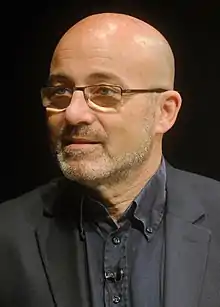 |
Roberto Cingolani | 13 February 2021 – 22 October 2022 | Independent | |
|
Undersecretaries
| |||||
| Minister of Infrastructure and Sustainable Mobility | 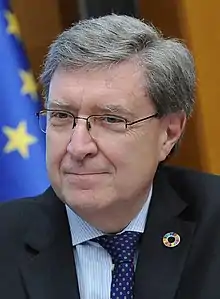 |
Enrico Giovannini | 13 February 2021 – 22 October 2022 | Independent | |
|
Deputy Ministers
Undersecretary
| |||||
| Minister of Labour and Social Policies | .jpg.webp) |
Andrea Orlando | 13 February 2021 – 22 October 2022 | Democratic Party | |
|
Undersecretaries
| |||||
| Minister of Education |  |
Patrizio Bianchi | 13 February 2021 – 22 October 2022 | Independent | |
|
Undersecretaries
| |||||
| Minister of University and Research | .jpg.webp) |
Maria Cristina Messa | 13 February 2021 – 22 October 2022 | Independent | |
| Minister of Culture | .jpg.webp) |
Dario Franceschini | 13 February 2021 – 22 October 2022 | Democratic Party | |
|
Undersecretary
| |||||
| Minister of Health |  |
Roberto Speranza | 13 February 2021 – 22 October 2022 | Article One | |
|
Undersecretaries
| |||||
| Minister of Tourism |  |
Massimo Garavaglia | 13 February 2021 – 22 October 2022 | League | |
| Minister for Parliamentary Relations (without portfolio) |
.jpg.webp) |
Federico D'Incà | 13 February 2021 – 22 October 2022 | Environment 2050 Before 30 July 2022: Five Star Movement | |
|
Undersecretaries
| |||||
| Minister of Public Administration (without portfolio) |
.jpg.webp) |
Renato Brunetta | 13 February 2021 – 22 October 2022 | Independent Before 21 July 2022: Forza Italia | |
| Minister of Regional Affairs and Autonomies (without portfolio) |
.jpg.webp) |
Mariastella Gelmini | 13 February 2021 – 22 October 2022 | Action Before 20 July 2022: Forza Italia | |
| Minister for the South and Territorial Cohesion (without portfolio) |
.jpg.webp) |
Mara Carfagna | 13 February 2021 – 22 October 2022 | Action Before 26 July 2022: Forza Italia | |
|
Undersecretary
| |||||
| Minister for Family and Equal Opportunities (without portfolio) |
.jpg.webp) |
Elena Bonetti | 13 February 2021 – 22 October 2022 | Italia Viva | |
| Minister for Youth Policies (without portfolio) |
.jpg.webp) |
Fabiana Dadone | 13 February 2021 – 22 October 2022 | Five Star Movement | |
| Minister for Technological Innovation and Digital Transition (without portfolio) |
.jpg.webp) |
Vittorio Colao | 13 February 2021 – 22 October 2022 | Independent | |
|
Undersecretary
| |||||
| Minister for Disabilities (without portfolio) |
.jpg.webp) |
Erika Stefani | 13 February 2021 – 22 October 2022 | League | |
| Secretary of the Council of Ministers | .jpg.webp) |
Roberto Garofoli | 13 February 2021 – 22 October 2022 | Independent | |
- ↑ Before 27 July 2022: Independent.
- 1 2 3 4 5 Before 21 June 2022: M5S
- ↑ Durigon resigned after tensions within the majority due to his support in renaming a public park of Latina after Arnaldo Mussolini, brother of the fascist dictator Benito Mussolini.
References
- ↑ "Mario Draghi sworn in as prime minister of Italy". the Guardian. 13 February 2021. Retrieved 15 February 2021.
- ↑ Balmer, Crispian (14 February 2021). "Italy's Draghi takes office, faces daunting challenges". Reuters. Retrieved 15 February 2021.
- ↑ Balmer, Crispian; Amante, Angelo (2 February 2021). "Italy's president calls on Draghi to save country from crisis". Reuters. Retrieved 15 February 2021.
- ↑ "Italian president Sergio Mattarella to seek a 'high-profile' government". the Guardian. 2 February 2021. Retrieved 15 February 2021.
- ↑ Harlan, Chico; Pitrelli, Stefano (12 February 2021). "Mario Draghi will be Italian prime minister. On the agenda: covid, an economic crisis and raising Italy's profile in the world". Washington Post. Retrieved 15 February 2021.
- 1 2 Johnson, Miles (13 February 2021). "Mario Draghi sworn in as Italy's new prime minister". Financial Times. Retrieved 15 February 2021.
- ↑ "Draghi government sworn in – English". ANSA.it. 13 February 2021. Retrieved 15 February 2021.
- ↑ Roberts, Hannah (12 February 2021). "Mario Draghi forms Italian government". POLITICO. Retrieved 15 February 2021.
- ↑ Horicka, Martin (22 February 2021). "Populists, Super Mario, and Italy's Last Hope". The National Interest. Archived from the original on 2021-02-23. Retrieved 3 March 2021.
- ↑
- Bachstein, Andrea. "Mario Draghi als Premierminister: Das italienische Experiment". Süddeutsche.de (in German). Retrieved 15 February 2021.
- Brankovic, Maja. "Mario Draghi in Italien: Sind Technokraten die besseren Politiker?". FAZ.NET (in German). Retrieved 15 February 2021.
- "The Guardian view on Mario Draghi: the right man for Italy ... for now | Editorial". the Guardian. 4 February 2021. Retrieved 15 February 2021.
- Pérez, Claudi; Verdú, Daniel (3 February 2021). "Draghi, un tecnócrata al rescate de Italia". EL PAÍS (in Spanish). Retrieved 15 February 2021.
- "Draghi: Call of duty for Italy's 'Super Mario'". BBC News. 12 February 2021. Retrieved 15 February 2021.
- "An Italian rescue mission for Mario Draghi". Financial Times. 3 February 2021. Retrieved 15 February 2021.
- Speciale, Alessandro; Follain, John; Albanese, Chiara (11 February 2021). "Super Mario Rides to Italy's Rescue Armed With Prestige and EU Funds". Bloomberg.com. Retrieved 15 February 2021.
- ↑ Horowitz, Jason (12 February 2021). "A Giant of Europe Prepares to Head Italy's New Unity Government". The New York Times. Retrieved 15 February 2021.
- ↑ Governo, Draghi scioglie la riserva e annuncia i ministri: Franceschini alla Cultura, Cartabia alla Giustizia, Franco all'Economia, Cingolani alla Transizione ecologica, la Repubblica
- ↑ "Italy's Mattarella dissolves parliament, election set for 25 September". euronews. 2022-07-21. Retrieved 2022-08-22.
- ↑ Meredith, Sam; Amaro, Silvia (13 January 2021). "Italy's government in crisis after former PM pulls support for ruling coalition". CNBC.com. CNBC. CNBC International. Retrieved 13 January 2021.
- ↑ "Italy PM Conte comfortably wins lower house confidence vote". Reuters. 2021-01-18. Retrieved 2021-01-18.
- ↑ "Italian PM Giuseppe Conte's government survives Senate confidence vote". euronews. 2021-01-19. Retrieved 2021-01-19.
- ↑ Il Senato vota la fiducia a Conte: il Governo ha la maggioranza relativa con 156 sì, Fanpage
- ↑ Legorano, Giovanni (January 25, 2021). "Italian Prime Minister Resigns Amid Struggle Over How to Revive Economy From Covid-19". The Wall Street Journal. Retrieved January 25, 2021.
- ↑ Consultazioni, Zingaretti: "Pd sostiene incarico a Conte, è punto di sintesi", la Repubblica
- ↑ Crimi “Pronti a confronto anche con Italia Viva, ma serve lealtà”, Il Tempo
- ↑ Governo: secondo giorno di consultazioni. Renzi: 'Dopo i veti ci dicano se ci vogliono', ANSA
- ↑ "Mattarella: "Adotterò un'iniziativa immediata". E convoca il presidente Fico per un mandato esplorativo". lastampa.it (in Italian). 2021-01-29. Archived from the original on 2021-01-29. Retrieved 2021-01-29.
- ↑ Governo, Causin (Europeisti): “Conte è elemento di attrazione, non escludiamo un partito. Italia Viva? Fa la schifiltosa ma è nata come noi”, Il Fatto Quotidiano
- ↑ Mattarella: “Possibile conferma della maggioranza attuale, va verificata”. Fico convocato al Quirinale, Il Fatto Quotidiano
- ↑ "La vecchia maggioranza non si è messa d'accordo" (in Italian). Il Post. 2 February 2021. Retrieved 2 February 2021.
- ↑ "Ex-ECB chief Mario Draghi asked to form Italy's next government". euronews. 2021-02-03. Retrieved 2021-02-03.
- ↑ Crisi governo, Draghi accetta l'incarico: "Vincere pandemia e rilanciare il Paese"., Sky Tg24
- ↑ Giuseppe Conte scende in campo. E si autodichiara federatore, Huffington Post
- ↑ "Berlusconi e Salvini: "Sostegno a Draghi con responsabilità e senza veti"". ilGiornale.it (in Italian). 2021-02-10. Retrieved 2021-02-11.
- ↑ Meloni attacca Salvini: "Non voterò la fiducia a Draghi, a lui Pd e la Boldrini vanno bene?", Internazionale
- ↑ "Zingaretti: "Unità contro chi vuole destabilizzare il Pd. Ora Costituente per riforme in Parlamento"". la Repubblica (in Italian). 2021-02-11. Retrieved 2021-02-11.
- ↑ "Dal voto Cinquestelle via libera al governo Draghi con il 59,3%. Di Maio: "Il movimento prende la via europea". Fico: "Niente salti nel buio"". lastampa.it (in Italian). 2021-02-11. Retrieved 2021-02-11.
- ↑ Giuffrida, Angela (12 February 2021). "Mario Draghi's new government to be sworn in on Saturday". The Guardian. Retrieved 13 February 2021.
- ↑ "Italy's Draghi sworn in as prime minister". The Canberra Times. 13 February 2021.
- ↑ "Il Governo Draghi, 23 ministri: 8 donne e 15 uomini. I tecnici sono otto" (in Italian). ANSA. 13 February 2021. Retrieved 13 February 2021.
- ↑ "Governo Draghi, prevalgono i ministri del Nord" (in Italian). Rai News. 12 February 2021. Retrieved 13 February 2021.
- ↑ Governo, ok del Senato alla fiducia a Draghi con 262 sì. "Grazie per la stima, andrà validata dai fatti". Nel M5S 15 votano contro, la Repubblica
- ↑ Forgnone, Valeria; Mari, Laura (18 February 2021). "Governo, ok della Camera alla fiducia con 535 sì, 56 no e 5 astenuti. Voto contrario di un leghista che passa a Fdi. Dissenso leghista a quota 32. Draghi: "Lotta alla corruzione e alle mafie"". La Repubblica (in Italian). Retrieved 18 February 2021.
- ↑ Draghi, ok al Senato senza record: oggi tocca alla Camera. Strappo M5S, Qui Finanza
- ↑ now expelled, 6 of them founded the group Alt
- 1 2 now expelled, 13 of them founded the group Alt
- ↑ now in FdI
- ↑ "Italian government on brink of collapse amid fears Mario Draghi could resign". the Guardian. 14 July 2022. Retrieved 21 July 2022.
- ↑ "Perché per il premier era inaccettabile la richiesta di Lega e FI". 20 July 2022.
- ↑ "Italy's Mario Draghi expected to resign as prime minister". the Guardian. 20 July 2022. Retrieved 21 July 2022.
- ↑ "Italy president calls snap elections after Draghi quits as PM". Financial Times. 21 July 2022.
- ↑ Chico Harlan; Stefano Pitrelli (2022-07-21) [2022-07-20]. "Italy's Mario Draghi resigns; new elections are set for September". The Washington Post. Washington, D.C. ISSN 0190-8286. OCLC 1330888409.
- ↑ "I Ministri del Governo Draghi". www.governo.it (in Italian). 13 February 2021. Retrieved 15 February 2021.
